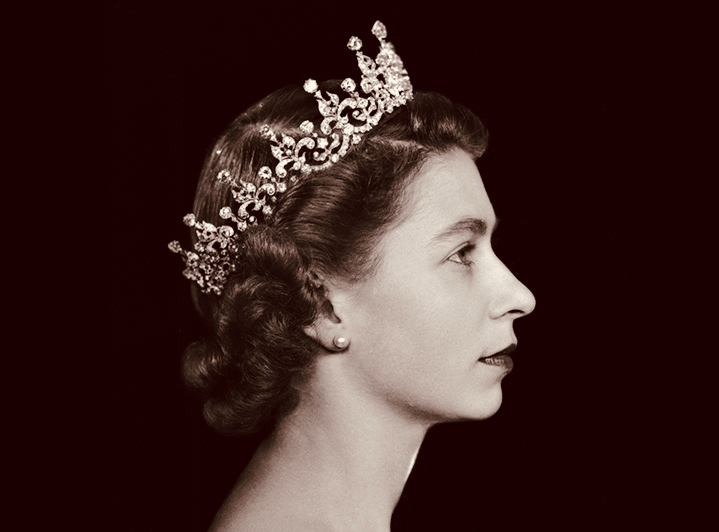
17 Sep I Imagine She’s A Pretty Nice Girl
Some Thoughts on the Passing of Her Majesty, Queen Elizabeth II
Well, first of all, I never met her. Never even came close, so far as I’m aware. If she was ever in line next to me at Whole Foods or if we were ever waiting for a flight in the same gate at the Albuquerque Sunport it managed to escape my notice. I detected no scrums of corgi dogs tearing about, no Gentlemen At Arms whispering into their lapels. She liked to keep things pretty low key, it is said, like not sporting the crown or waving a scepter about unless circumstance specifically called for it.
As has been pointed out in these pages on prior occasion(s), I am an unreconstructed and unrepentant Anglophile. I cannot say with any specificity quite how this came to be, but at some point—far, far back in my days as a wee lad in New Orleans—something about our cousins across the pond tweaked my fancy. The most likely scenario is that it began with the Beatles, of whom I became enamored while still in my grade school years.
I have my grandparents to thank for that. For one thing, my grandmum was born in London. I don’t know how long she lived in Blighty before her family immigrated to the US of A, but she retained a distinct trace of an English accent throughout her long days. Most auspiciously, on one of their visits to New Orleans my grandparents bestowed upon me a momentous gift: Two vinyl offerings, undoubtedly purchased upon the recommendation of some astute record store clerk in Evanston, Illinois, where they lived. The vinyl offerings were Arlo Guthrie’s hit 1967 album ‘Alice’s Restaurant,’ and the first Beatles release on their own Apple Records label: A ‘double A-side’ single—‘Hey Jude’ backed with ‘Revolution.’ It was 1968 and I was eight years old.
When the Beatles arrived in my little world I became aware that something interesting was going on over there in England… in Great Britain… in the United Kingdom. What was with all the names? Plus there was an Empire and, at some point subsequent to that, a Commonwealth. Were these different names for the same thing or different things altogether? Whatever the explanation, here were some people that more or less talked like us and more or less looked like us (except for the teeth, maybe), but they did odd things like drive on the wrong side of the road and drink tea rather than coffee.
And they had royalty. They had a Queen. She lived in a castle. Several castles.
We had no royalty, no castles. We had rich people who lived in houses bigger than ours and drove cars more expensive than ours. We had presidents and other politicians, movie stars, sports heroes and such but these were still just… people. The Queen was not just people. She was a very special kind of person and there was only one of her.
As I grew up I learned more about England, Great Britain—whichever—and the global significance of this little island in the North Atlantic. The entire country could fit easily inside of New Mexico with room to spare. It seemed extraordinary that such a tiny place could have such an outsize impact—for better or worse—on the entire planet. Stonehenge, cucumber sandwiches, Tower Bridge, Twiggy, Rolls Royce, Winston Churchill, Piccadilly Circus—it was all fascinating to me. The countless similarities and quirky differences between American and British life and culture were, and still are, endlessly intriguing and amusing.
For me, the primary impact of the Brits was musical. The Beatles, first and foremost, but also the Rolling Stones, the Who, Rod Stewart & the Faces, the Kinks, the Yardbirds, David Bowie, Led Zeppelin. American rock & rollers just didn’t have equivalent style and attitude (except for the Doors, perhaps, but I wasn’t onto them yet). In those days, Elvis still ruled the roost at home and I could care less about him.
In the summer of 1972 I traveled abroad with my family for the first time. We spent several weeks in southern Europe before ending our trip in England and Scotland. I was actually there, on the same London streets as my heroes. We stayed at the Cumberland Hotel at Marble Arch (now part of the Hard Rock chain)—a favored residence of Jimi Hendrix. He was registered as a guest at the Cumberland when he met his tragic and untimely demise just two years earlier. I lifted a Do Not Disturb sign from the Cumberland which I have to this day.
My parents were good about letting me wander on my own and I took to the streets, wide eyed. Hyde Park—where the Stones, Blind Faith and others had played huge free concerts in 1969—was right across Bayswater Road. Abbey Road Studios were a short drive north in St. John’s Wood. The Apple headquarters building on Savile Row was even closer. Buckingham Palace was about a half hour walk down Park Lane. I don’t know if the Queen was in residence when I stood goggling outside the gates, but this was her house!
London was pure magic to me. It seemed to be still struggling to cast off the pall of post-war grayness and grime, but so far as I was concerned that only served to enhance the allure.
Throughout my many years of fascination with all things British, Her Majesty has been the constant. As an American, she was not my queen, as such, but she was the Queen. Forty countries currently have monarchies of one sort or another. Queen Elizabeth II was the sovereign of 15 of them. No disrespect to Margrethe of Denmark, but for the last 70 years any reference to ‘the Queen’ has been reflexively assumed to refer to her third cousin, Elizabeth. The outpouring of love and respect that is currently paralyzing central London as the Queen lies in state in Westminster Hall is but a small measure of the profound effect of her remarkable constancy and longevity.
It is unsurprising that, upon the passing of Great Britain’s longest reigning monarch, voices should arise to address the painful legacy of empire. The British Empire was the largest of all the great colonial powers. At its peak in the 1920s, its dominion extended over a quarter of the planet. This country—my country—came into existence when its colonial subjects determined that the ties that bound them to the British Empire had become unacceptably onerous and oppressive. We’ve had copious time to resolve our differences and develop the Special Relationship that now binds our nations. It took other colonies—in Africa, Asia, the Middle East, the Indian subcontinent, the Caribbean—centuries longer to achieve their independence.
To me, at least, it does not feel entirely fair to lay upon Elizabeth II the burden of being—or, rather, having failed to be—the royal apologist. Queen Elizabeth II was the great great granddaughter of Queen Victoria, the granddaughter and daughter of kings. She was the mother and grandmother of future kings. Her extended family tied her to every royal house in Europe. It was not in her nature—perhaps not in the nature of royalty in general—to apologize.
Whatever the transgressions of Elizabeth’s ancestors, she was never going to be the person to introduce woke-ness to the House of Windsor. She was the thread that bound the modern world to the old and any such admission of culpability would be not only upon herself, but also upon her family—the generations of her forebears and the generations yet to come. It is possible that the task of atoning for the sins of the past might be taken up by the new King. Charles III will be Great Britain’s first fully post-colonial monarch but he is not a young man. Whatever innovations he brings to the monarchy, it seems more likely that any reckoning will fall to the generation that follows him.
Such a vague possibility—and it is certainly no more than that—will likely be insufficient for many, but I would hope that even the most ardent anti-monarchist could, at least for a moment, set aside division and acknowledge a life dedicated to the service of country.
In the end, I think it’s not by chance that the last song on the last Beatles album was a 26-second acoustic guitar ditty titled ‘Her Majesty.’ Sir Paul McCartney summed up his thoughts on the Queen as thus:
I imagine she’s a pretty nice girl but she doesn’t have a lot to say
I imagine she’s a pretty nice girl but she change from day to day
I wanna tell that I love her a lot but I gotta get a belly full of wine
I imagine she’s a pretty nice girl and someday I’m gonna make her mine
Oh yeah, someday I’m gonna make her mine
I think it’s a good guess that the Queen found this amusing.
She was an extraordinary person. She was living history. Now she is gone and with her goes an entire era, an entire world. We shall not see the likes of her again.
